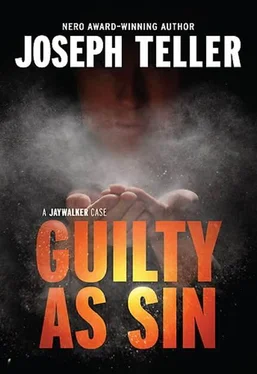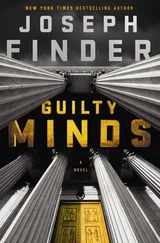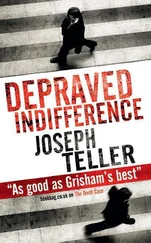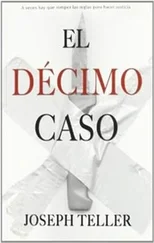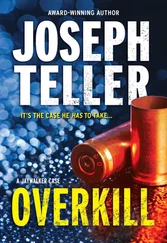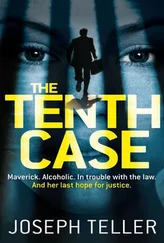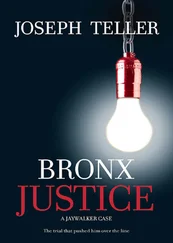Joseph Teller - Guilty As Sin
Здесь есть возможность читать онлайн «Joseph Teller - Guilty As Sin» весь текст электронной книги совершенно бесплатно (целиком полную версию без сокращений). В некоторых случаях можно слушать аудио, скачать через торрент в формате fb2 и присутствует краткое содержание. Жанр: Криминальный детектив, на английском языке. Описание произведения, (предисловие) а так же отзывы посетителей доступны на портале библиотеки ЛибКат.
- Название:Guilty As Sin
- Автор:
- Жанр:
- Год:неизвестен
- ISBN:нет данных
- Рейтинг книги:5 / 5. Голосов: 1
-
Избранное:Добавить в избранное
- Отзывы:
-
Ваша оценка:
- 100
- 1
- 2
- 3
- 4
- 5
Guilty As Sin: краткое содержание, описание и аннотация
Предлагаем к чтению аннотацию, описание, краткое содержание или предисловие (зависит от того, что написал сам автор книги «Guilty As Sin»). Если вы не нашли необходимую информацию о книге — напишите в комментариях, мы постараемся отыскать её.
Guilty As Sin — читать онлайн бесплатно полную книгу (весь текст) целиком
Ниже представлен текст книги, разбитый по страницам. Система сохранения места последней прочитанной страницы, позволяет с удобством читать онлайн бесплатно книгу «Guilty As Sin», без необходимости каждый раз заново искать на чём Вы остановились. Поставьте закладку, и сможете в любой момент перейти на страницу, на которой закончили чтение.
Интервал:
Закладка:
But exactly how was he supposed to go about meeting that burden? A high-ranking police captain, a senior lieutenant, an experienced federal agent and a supporting cast of characters had all testified, some implicitly but several quite explicitly, that Clarence Hightower hadn’t been cooperating with them. Lying about that fact would have constituted not only a serious violation of departmental rules, one serious enough to justify firing the violator, but a felony punishable with prison time. Added to that was the fact that neither Hightower’s name nor his nickname was to be found anywhere in the official cross-index of informers maintained by the NYPD.
And just in case Jaywalker was somehow able to bridge that gap, it would still be incumbent upon him to prove that the defendant wasn’t “otherwise disposed to commit the offense.” In other words, he’d have to convince the jurors that absent the inducement or encouragement, Barnett never would have made the sales. Finally, whoever had written the statute had gone to great lengths to add not just one but two additional caveats. First they’d inserted language requiring that the inducement or encouragement be “active.” And just in case that wasn’t enough of a hurdle, they’d added one last disqualifier, proclaiming that “conduct merely affording a person an opportunity to commit an offense does not constitute entrapment.”
Talk about an uphill battle…
Still, Jaywalker felt that meeting those tests would be the easy part, easy being a relative term. The hard part, perhaps the impossible part, was going to be convincing the jurors that, despite all the denials and despite his absence from the cross-index, Clarence Hightower had nevertheless been working with the Man.
Which is why he’d spend the rest of the weekend working on his summation, not getting to bed until well after midnight Sunday. Why he’d awake bleary-eyed, why he’d cut himself while shaving, and why he’d end up wearing one black shoe to court and one brown one.
But he’d be ready to sum up.
19
Jaywalker was precisely one sentence into his summation Monday morning when it happened. As always, he’d dispensed with the silly formalities that all other trial lawyers seemed to feel obliged to start off with. There was no “Ladies and gentlemen of the jury” for Jaywalker, no “May it please the court.” Not even a “My client and I are indebted to you for the close attention you’ve obviously paid throughout the trial.”
He’d started out on the right foot ten years earlier, winning acquittals in the majority of his trials at the Legal Aid Society in an era when he would have gone to the head of the class simply by winning one out of three. Judges, prosecutors and colleagues quickly branded him a natural. But the truth was, it was his years as a DEA agent that had prepared him for the work. Even as he’d learned to talk like a defendant, he’d also figured out how to think like a cop. By the time he arrived at Legal Aid, Jaywalker could pick up a written complaint and, in the time it took him to read it, know not only what was true in it and what wasn’t, but what had actually happened out there on the street.
Yet even though winning more often than losing gained him respect and reputation, those things weren’t nearly enough for Jaywalker. The acquittals were certainly sweet, both for him and his clients. But each conviction would plunge him into the depths of depression. So the very next time out, he’d change something in his approach. And if the change worked, he stuck with it. They could be big things, these changes, such as alerting the prospective jurors at the earliest possible opportunity that the defendant had a criminal record. Or they could be little tweaks, like dispensing with the niceties and jumping right into the narrative with the first words of his summation.
By the time of the Alonzo Barnett trial, Jaywalker had changed enough things in his repertoire that he was winning four out of every five cases he tried. Over time he’d manage to push that rate all the way up to nine out of ten, an absolutely unheard of statistic for a criminal defense lawyer.
By the time he stood that Monday morning to face Alonzo Barnett’s jury, the Jaywalker Summation had already evolved from pretty good to absolutely riveting and was well on its way toward legendary. But the perfectionist in Jaywalker understood the hard reality that neither meeting nor exceeding any of those descriptives guaranteed success.
Convictions happened, as he knew only too well.
Earlier that very morning, in fact, he’d run into a friend, a fellow defense lawyer named Blackstone, while riding up to the fifteenth floor. Taking in Jaywalker’s blue suit, white shirt and conservative tie-and evidently unable to notice the contrasting colors of his shoes in the crowded elevator-the guy had asked if he was summing up.
“Yup,” Jaywalker had answered.
“What kind of case?”
“Sale.”
Blackstone had grimaced almost reflexively. “Well,” he’d said, “good fucking luck.”
Translation? Because jurors invariably ended up believing cops, sale cases were all but unwinnable. Which might have been a good enough excuse for Blackstone, but not for Jaywalker. All but unwinnable was where they separated the men from the boys. All but unwinnable was Jaywalker’s briar patch.
“It is a Monday, a Monday in September, perhaps twenty months ago this very day,” Jaywalker had begun, taking the jurors back with him to that fateful day when Clarence Hightower had first shown up on the stoop of Alonzo Barnett’s apartment building.
And that was as far as he got.
He never saw the court officer rise quietly from his seat and walk to the wooden partition that separated the well of the courtroom from the audience section. Nor did he hear the officer whispering to the man standing on the other side of the partition, ordering him to find a seat. Because Jaywalker had been standing directly in front of the jurors as he’d begun to address them, those things had taken place behind him, out of his field of vision.
But he quickly became aware that as much as the jurors were trying to give him their undivided attention, something was distracting them. First one pair of eyes, then another, then five or six more, were looking past him and focusing on someone or something else.
Almost reflexively, he turned to see what they were watching. There at the partition, a uniformed court officer was pressing one index finger to his lips while using the other to direct a tall black man toward an empty section of seats in the third row. But the man wasn’t obeying the officer’s instructions. Instead he was gesturing frantically in Jaywalker’s direction, trying to make himself understood.
Which was right about when Jaywalker recognized the man. It was Kenny Smith, Jaywalker’s official unofficial investigator, who’d testified earlier in the trial.
“Please excuse me,” Jaywalker told the jurors, turning and stepping away from them. Then, even as Shirley Levine reached for her seldom-used gavel, he raised a hand and asked if he might be permitted to approach the man. Which he did, without bothering to wait for her response.
He quickly reached the partition and assured the court officer that he knew the man, and knew he wasn’t a threat of any sort. Then he turned his attention to Smith.
“What are you doing? ” he whispered.
“I’ve got him,” Smith whispered back. “He’s here. ”
But there are whispers, and there are not-quite-whispers. And in Kenny Smith’s inability to contain his excitement, his reply fell squarely into the latter category, the sort guaranteed to draw a sharp rebuke from any librarian within a hundred yards. But on this Monday morning in Part 91 there were no librarians in sight, only a gavel-banging judge, a bunch of jurors and a few rows of spectators.
Читать дальшеИнтервал:
Закладка:
Похожие книги на «Guilty As Sin»
Представляем Вашему вниманию похожие книги на «Guilty As Sin» списком для выбора. Мы отобрали схожую по названию и смыслу литературу в надежде предоставить читателям больше вариантов отыскать новые, интересные, ещё непрочитанные произведения.
Обсуждение, отзывы о книге «Guilty As Sin» и просто собственные мнения читателей. Оставьте ваши комментарии, напишите, что Вы думаете о произведении, его смысле или главных героях. Укажите что конкретно понравилось, а что нет, и почему Вы так считаете.
